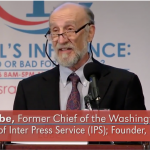I have a new piece up at Tehran Bureau, the PBS/Frontline project on Iran.
The article is a look into the possible reasons that Israel has pushed back the nuclear timeline for Iran. I quote Tony Karon at length (which appears at TB) and list my own thoughts (some via Jim):
That notion — that you can’t whip up your own population into a fearful frenzy, then not do anything — tracks with comments made in the past by top Israeli officials casting aside the “existential threat” meme. Along with Barak, former Mossad chief Efraim Halevy sounded a confident note in late 2009: “It is not within the power of Iran to destroy the state of Israel — at best it can cause Israel grievous damage. Israel is indestructible.”
But there are other possibilities to consider, most of them speculative. Perhaps Israel was merely gloating about its covert actions against Iran. Many mainstream commentators suggest Israel is behind the Stuxnet computer worm that damaged Iranian centrifuges as well as a campaign of assassinations of Iranian nuclear scientists. Maybe, as Jim Lobe suggested to me in a conversation, there was some kind of quid pro quo between the U.S. and Israel over the public extension of Israel’s nuclear clock.
There are certainly many pawns on the board to trade between Israel and the U.S. at the moment: an Israeli settlement freeze (whether including East Jerusalem or not), the fate of imprisoned Israeli spy Jonathan Pollard, a U.S. offer of an Israeli wish list of military hardware (as discussed in earlier failed talks on a freeze), or maybe even some sort of agreement for Israel to drop mounting preconditions for yet another round of direct talks. All are possibilities, though some quite unlikely.
It’s worth noting, that as a source close to high-ranking Israelis put it to LobeLog, Israel has shifted its focus from the threat of Iran to the threat of “delegitimizers.” The latter is an amorphous and misleading catchall phrase that the Israeli right and their Stateside defenders use to indict the motives of anyone who even comes near the Boycott, Divestment, and Sanctions (BDS) movement against Israel.
I also add that Paul Pillar, writing on the website of the National Interest, has an interesting post listing some possibilities:
One is that they are more or less straightforward reflections of careful, straightforward analysis by Israeli experts of the actual state of the Iranian program. Not every statement by a public official needs to be a disingenuous manipulation of the facts in pursuit of a policy objective. Sometimes we need to resist the tendency to overanalyze someone else’s motives.
Given Israel’s track record, I’m skeptical of this lack of skepticism. But some of Pillar’s other possibilities track with the ones I enumerated, and all are well worth reading.
Matt Duss at The Wonk Room, meanwhile, picks up on an interesting Der Spiegel interview with new IAEA chief Yukiya Amano. Duss notes that Amano told the German daily, “Despite all unanswered questions, we cannot say that Iran is pursuing a nuclear weapons program.”
You’ll recall, of course, that Amano told U.S. officials that “he was solidly in the U.S. court on every key strategic decision” — including Iran — according to U.S. diplomatic cables. As Duss points out, this aligns perfectly with the view Amano espoused in his Der Spiegel interview — because the “U.S. court” on this particular “key strategic issue” corresponds with a public acknowledgment by the CIA (PDF) that the U.S. does “not know whether Tehran will eventually decide to produce nuclear weapons.”
On the other hand, the Wall Street Journal‘s neoconservative editorial board recently declared (falsely) that Iran had already “announced its intention to build a nuclear bomb.”
As I wrote on Tehran Bureau, none of the recent developments seem to have had much impact on U.S.-based Iran hawks, who are perfectly content to keep beating the war drums. No matter what Iran does or how its nuclear program advances (if at all), the hawks want to attack it. No matter how effective sanctions are, they will never be enough.





I should say, the few Jewish friends I have are set against such an attack. Perhaps, the Israeli Government has realized, at last, that an attack on Iran would push the price of oil into the stratosphere (whether the Gulf of Hormuz was closed or not) and, that when gas reaches ten dollars a barrel – if there is any, that is – most people in the West will make little distinction between Israelis and the Jewish people as a whole.